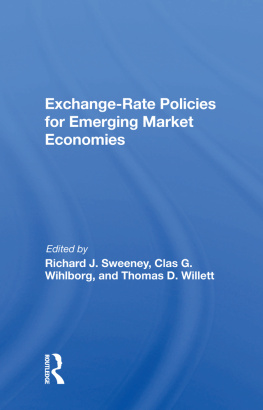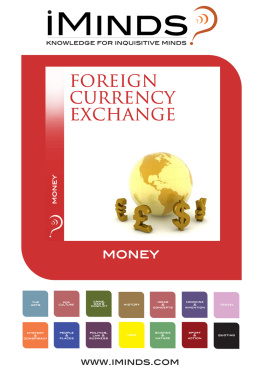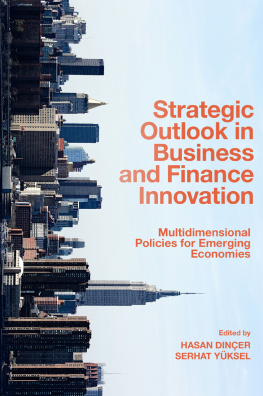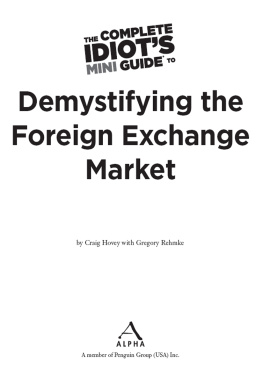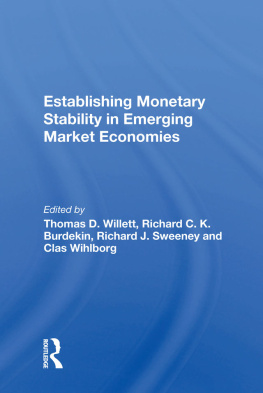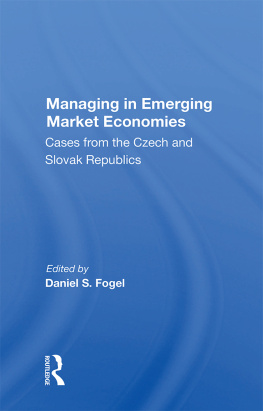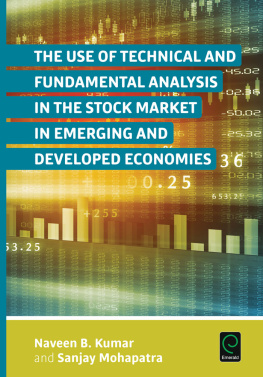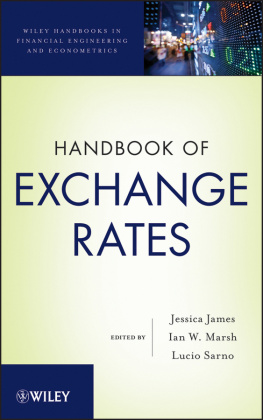Exchange-Rate Policies for Emerging Market Economics
The Political Economy of Global Interdependence
Thomas D. Willett, Series Editor
Exchange-Rate Policies for Emerging Market Economies, edited by Richard J. Sweeney, Clas G. Wihlborg, and Thomas D. Willett
Capital Controls in Emerging Economies, edited by Christine P. Ries and Richard J. Sweeney
Judging Economic Policy: Selected Writings of Gottfried Haberler, edited by Richard J. Sweeney, Edward Tower, and Thomas D. Willett
Political Capacity and Economic Behavior, edited by Marina Arbetman and Jacek Kugler
Interest Groups and Monetary Integration: The Political Economy of Exchange Regime Choice, Carsten Hefeker
Growth, Debt, and Politics: Economic Adjustment and the Political Performance of Developing Countries, Lewis W. Snider
Closure in International Politics: The Impact of Strategy, Blocs, and Empire, John A. Kroll
Exchange-Rate Policies for Emerging Market Economies
Edited By
Richard J. Sweeney , Clas G. Wihlborg , and Thomas D. Willett
First published 1999 by Westview Press
Published 2018 by Routledge
52 Vanderbilt Avenue, New York, NY 10017
2 Park Square, Milton Park, Abingdon, Oxon OX14 4RN
Routledge is an imprint of the Taylor & Francis Group, an informa business
Copyright 1999 Taylor & Francis
All rights reserved. No part of this book may be reprinted or reproduced or utilised in any form or by any electronic, mechanical, or other means, now known or hereafter invented, including photocopying and recording, or in any information storage or retrieval system, without permission in writing from the publishers.
Notice:
Product or corporate names may be trademarks or registered trademarks, and are used only for identification and explanation without intent to infringe.
A CIP catalog record for this book is available from the Library of Congress.
ISBN 13: 978-0-367-00968-7 (hbk)
Contents
, Richard J. Sweeney, Clas Wihlborg, and Thomas D. Willett
, Eduard Hochreiter
, Linda S. Goldberg
, Thomas D. Willett and Clas Wihlborg
, Jilleen R. Westbrook and Thomas D. Willett
, Richard C. K. Burdekin, Heidi Nelson and Thomas D. Willett
, Gediminas Dubauskas, Clas Wihlborg and Thomas D. Willett
, Pamela Martin, Jilleen R. Westbrook and Thomas D. Willett
, Reuven Glick, Michael Hutchison and Ramon Moreno
, Richard J. Sweeney
, Sven W. Arndt
, Pierre L. Siklos and Istvn bel
, Richard J. Sweeney
, Mrten Ross
, Gediminas Dubauskas
, Miroslav Hrn
, Pl Gspr
, Tadeusz Kowalski and Renata Stawarska
, King Banaian and Eugenue Zhukov
This is the third and final volume resulting from a collaborative project on international and monetary aspects of economic reform in the former communist countries undertaken by the Claremont Colleges, Georgetown University and the School of Economics and Commercial Law at Goteborg University. The two previous volumes are Establishing Monetary Stability in Emerging Market Economies (1995) and Capital Controls in Emerging Market Economies (1997), also published by Westview Press. The Claremont portion of the project was administered through the Claremont Institute for Economic Policy Studies at the Claremont Graduate University and the Lowe Institute of Political Economy at Claremont McKenna College and was funded primarily through a generous grant from the Lincoln Foundation.
The Georgetown School of Business at Georgetown University provided further support through faculty summer grants, and workshop funding was provided from Georgetown's Finance/Accounting seminar series. Professor Sweeney also wishes to thank the Georgetown University Center for International Business Education and Research for travel and workshop funds, and the Georgetown University Center for Business-Government Relations for supplying summer research assistance.
Activities of the Swedish research group and conferences in Goteborg, Sweden, and Tallinn, Estonia, were funded by the Royal Academy of Sciences, the Research Council for Humanities and Social Research, and the School of Economics and Commercial Law at Goteborg University, Sweden. Additional funding for conferences in Tallinn was provided by the Bank of Keila and the Open Estonian Foundation in Estonia.
A major purpose of the project was to establish economic policy dialogues between Western economists and economists and policy officials from the former communist countries. The emphasis was not on having Western economists tell Eastern economists what to do, but rather to enter into discussions which would culminate in shared agreement about the nature of the key issueseven if there was not always agreement about policy recommendations. To this end we organized a substantial number of conferences and workshops which brought economists and officials from the former communist countries to Claremont, Georgetown, and Goteborg and brought groups of Western economists to locations in Central Europe and the former Soviet Union. We especially appreciate the cooperation of local host institutions: the Czech National Bank in Prague, the Czech Republic; Tallinn Technical University in Tallinn, Estonia; the Institute for World Economics in Budapest, Hungary; and the Institute for Advanced Studies and the Austrian National Bank in Vienna, Austria.
Special thanks go to Pamela Martin of the Claremont Institute of Economic Policy Studies and Karin Hane of Goteborg University for their excellent work in preparing the manuscript for publication.
Richard J. Sweeney
Clas Wihlborg
Thomas D. Willett
Exchange-Rate Policies for Emerging Market Economics
Richard J. Sweeney , Clas Wihlborg and Thomas D. Willett
Exchange Rate Regime Choice: The Debate
The merits and limitations of fixed versus flexible exchange rate regimes are the focus of one of the most long-standing debates in economics. There are important costs to both fixed and flexible rates, the relative costs of each depending on a country's characteristics and circumstances. As a consequence, policymakers in many countries have attempted to avoid choosing between these extremes and have opted for compromise regimes of adjustable or crawling pegs. This was the basic philosophy of the Bretton Woods international monetary system set up at the end of World War II. However, both economic and political considerations make such compromise systems difficult to manage effectively. This is especially true in a world of high international capital mobility.
The adjustably pegged exchange rate regime of the Bretton Woods system broke down in the early 1970s, but the lessons of this experience were not always remembered. In the 1980s and 1990s, various forms of pegged rate regimes again became popular across the globe, being adopted in Western and Eastern Europe, Asia and Latin America. In the 1990s, the difficulties of managing adjustably pegged exchange rates have once again been dramatically illustrated. The latest example of this point is the Asian currency crises of 1997-98, but many others abound, including the crises surrounding the Bulgarian lev, the Mexican peso, and the Russian ruble in 1994, the European monetary crises in 1992 and 1993 and the failure of the Bretton Woods system itself in the early 1970s. As the workability of compromise exchange rate regimes has become questionable, the choices facing policymakers have become more difficult. To a large extent the current controversy over exchange rate policies in the emerging market economies has simply transferred an ongoing debate to a new battleground. There are, however, arguments about the applicability of fixed or flexible exchange rate regimes based on the special circumstances of the emerging market economies.


